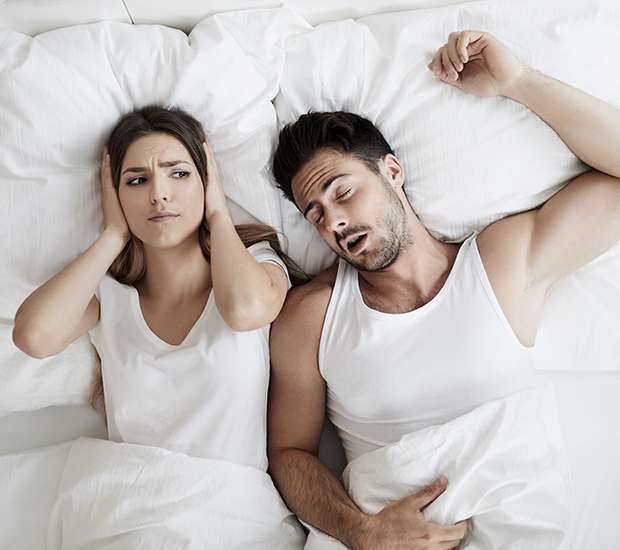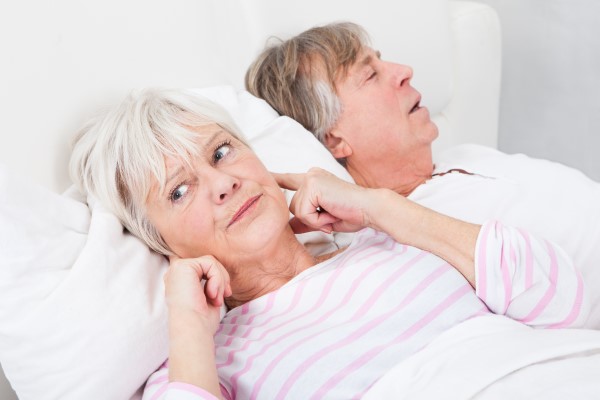Sleep Apnea Treatment Huntersville, NC
If you feel like you have no energy and are too tired to keep up with your friends and family, visit our dental office for a sleep apnea consultation. Sleep apnea could be what’s causing your issues, and simple non-invasive treatment may be what you need to feel like yourself again. To schedule an appointment with our dental office, call (704) 895-3858..
We’ll be happy to discuss your treatment options and make a recommendation for how you should proceed. Dr. Guice is certified as a Diplomate of the American Board of Dental Sleep Medicine and can help you reclaim your quality sleep once again.
Sleep Apnea QuizWhat is Sleep Apnea?
Sleep is essential for the body because it serves as a recovery and rejuvenation period. Without a steady flow of oxygen, your body isn’t able to replenish itself. This leads to you feeling drained and sluggish as well as putting you at a higher risk of physical and mental conditions.
Since the interferences in breathing occur during sleep, many people have no idea that they’re suffering from sleep apnea.
Types of Sleep Apnea
There are three types of sleep apnea you may be diagnosed with. While they each interfere with your breathing during sleep, they do so in different ways.
Obstructive Sleep Apnea (OSA)
When you suffer from Obstructive Sleep Apnea, the tissue of the mouth and throat tends to collapse in the airway during sleep, making it impossible to breathe freely. The loose tissues in the throat cause people with OSA to frequently snore or sound like they are choking in their sleep. This is one of the signs that the body is trying to fight for breath. OSA can also be caused by an excess of tissue in the throat, which is one reason why obesity is a risk factor for the condition.
Central Sleep Apnea (CSA)
For patients with Central Sleep Apnea, the brain is the cause of their irregular breathing. After a pause in signals to the muscles responsible for breathing, your body fails to respond as it normally should. CSA cannot be treated by a dentist and will instead require care by a specialist. Typically, CSA is a secondary condition brought on by another illness and treatment will be focused on addressing the underlying cause. Treatments for CSA may include lifestyle changes and medication in combination with the use of a
Complex/Mixed Sleep Apnea (MSA)
Complex or Mixed Sleep Apnea occurs when patients exhibit signs of both obstructive and central sleep apnea. The treatment may be a combination of interventions which can include oral appliances and treatment for an underlying cause.
Complex or Mixed Sleep Apnea occurs when patients exhibit signs of both obstructive and central sleep apnea. The treatment may be a combination of interventions which can include oral appliances and treatment for an underlying cause.
In order to reach a proper diagnosis for any form of sleep apnea, you’ll need to undergo a sleep study. These can be completed at a dedicated facility or with evaluation tools you’ll use at home.
Symptoms of Sleep Apnea
The most common symptom of sleep apnea is snoring, which is usually reported by a loved one rather than the person afflicted with the condition. There are other symptoms that can indicate sleep apnea, so it’s important to know the signs and pay close attention to your body and mood. The most common signs of sleep apnea are:
- Sleepiness or fatigue during the day
- Waking up frequently in the middle of the night
- Sore throat or dry mouth upon awakening
- Headaches upon awakening
- Nighttime sweating
- Frequent urination in the middle of the night
- Difficulty concentrating and forgetfulness
- Irritability
- Anxiety or depression
Check out what others are saying about our sleep apnea support services on Yelp: Do I Have Sleep Apnea?
Sleep Apnea Affects Your Total Body
The multiple interruptions to your sleep paired with a lack of oxygen to the brain can leave you feeling tired and sluggish throughout the day. However, the effects of sleep apnea don’t stop there—your overall bodily wellness is in jeopardy when your body doesn’t get the sleep it needs.
There are many health problems that can arise from untreated sleep apnea, as the reduced intake of oxygen can affect many of your organs and bodily systems. Sleep deprivation can lead to a weakened immune system, which means your body won’t be able to fight off infections as reliably. You’re also more likely to experience health complications like stroke, high blood pressure, headaches, diabetes, and heart failure.
Sleep apnea negatively impacts your mental health as well. When left untreated, you may experience more mood swings as well as increased chances of developing mood disorders such as depression and anxiety. For patients with existing mental health issues, sleep apnea can often worsen symptoms.
Sleep Apnea & Interpersonal Relationships
Without enough oxygen during sleep, your body will struggle to maintain proper function. Beyond the health effects, this can translate to not having enough energy to stay awake past dinner, enjoy your child’s birthday parties, go for a bike ride, or even safely operate a vehicle.
With symptoms like snoring, your partner’s sleep may also be negatively affected and cause arguments or resentment. Sleep apnea can impair your sex drive, which may lead to further strain on relationships.
Since sleep apnea can greatly diminish your quality of life, it’s critical that you visit our Huntersville dentist for effective treatment solutions.
Treating Obstructive Sleep Apnea
The most common treatments for obstructive sleep apnea include the use of a CPAP machine, an oral appliance, various lifestyle changes, or surgery. At Lake Norman Dentistry, we recommend that patients explore non-invasive treatment options first.
A CPAP machine helps to provide patients with a constant and steady flow of air, but can sometimes be loud and uncomfortable to wear. This is why we’ll often suggest that our Huntersville, NC patients wear a removable oral appliance. Customized oral appliances are a convenient treatment option because they’re comfortable, don’t make any noise, and are incredibly discrete.
Dr. Guice may also recommend lifestyle changes in order to reduce excess weight that may be contributing to your obstructive sleep apnea symptoms. For some patients, surgery may be an option in order to remove the extra fatty tissue blocking the airway.
How Oral Appliances Work
Wearing an oral appliance is incredibly simple and comfortable. It’s customized for your mouth specifically to ensure a snug and secure fit. As a result, you can just slip it into place when you go to sleep. It will remain in place inside of your mouth and does an excellent job of holding your lower jaw in the forward position. This prevents your tongue from falling backward and helps keep your airway clear.
Some people receive all of the benefits they need by wearing an oral appliance, while others with severe sleep apnea may require the use of a CPAP machine at the same time. In these cases, most patients report that their CPAP is far more comfortable than when they were using it as a standalone treatment option.
To learn more about sleep apnea or discuss your oral health in general, call 704-895-3858 and schedule an appointment with our Huntersville dental office. At Lake Norman Dentistry, we are happy to discuss your health challenges and make recommendations, even if we have to refer you to a specialist for treatment.
Questions Answered on This Page
Q. Is sleep apnea a sleep disorder?
Q. What are the treatment options for sleep apnea?
People Also Ask
Definition of Dental Terminology
- Cosmetic Dentistry
- Cosmetic dentistry is generally used to refer to any dental work that improves the appearance (though not necessarily the function) of a person’s teeth, gums and/or bite.
- Decay
- Tooth decay is when the enamel of the tooth begins to decay and cause erosion from plaque and tartar on the teeth.
- Dental Caries
- Dental caries is also known as cavities and result from a lack of proper oral hygiene leaving plaque that forms tiny holes in the teeth.
- Dental Checkup
- A dental checkup is an appointment that involves cleaning the teeth, identifying any signs of infection and removing said signs of infection at least once every six months in the office.
- Dental Filling
- A dental filling involves restoring the structure of the tooth by using metal, alloy, porcelain or plastic to fill the tooth.
- Dental Prophylaxis
- A dental prophylaxis is a professional and detailed cleaning that involves the removal of plaque, calculus and stains from the teeth.
- Dental Sealants
- Dental sealants contain a resinous material that we apply to the chewing surfaces of the posterior teeth to prevent dental caries.
- Dentist
- A dentist, also known as a dental surgeon, is a doctor who specializes in the diagnosis, prevention, and treatment of diseases and conditions of the oral cavity.
- Gingivitis
- Gingivitis is the inflammation of gum tissue that results from plaque, other infections in the mouth and poor oral hygiene.
- Preventive Dentistry
- Preventive dentistry is the dentistry that focuses on maintaining oral health in order to prevent the spread of plaque, the formation of tartar and infections in the mouth.
- Tartar
- Tartar forms when plaque builds up on the surface of the teeth and calcifies into a hard surface that is much more difficult to remove and will require professional treatment.
- Tooth Enamel
- Tooth enamel is the protective visible outer surface of a tooth that contains the dentin and dental pulp.
Back to top of Do I Have Sleep Apnea?




